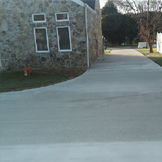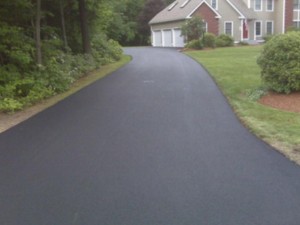 When you have a concrete driveway, patio, or other structure on your property, you might want to think about caring for it as well as you can. You want your concrete to last as long as possible so that you don’t have to replace it for a long time. Caring for your concrete is easy and cost effective for your property in the long run. Let’s take a look at some of the things you can do to care for your concrete.
When you have a concrete driveway, patio, or other structure on your property, you might want to think about caring for it as well as you can. You want your concrete to last as long as possible so that you don’t have to replace it for a long time. Caring for your concrete is easy and cost effective for your property in the long run. Let’s take a look at some of the things you can do to care for your concrete.
Sealant is Your Friend
Placing a sealing coat onto your concrete will be incredibly helpful down the line. Make sure to invest in a proper sealant so that you know your investment will last. After all, your concrete will probably be taking quite a beating depending on where it is placed. A concrete driveway will certainly experience a sizable amount of wear and tear. If you placed sealant on your concrete a long time ago, then you may want to reseal it. It’s better to protect the concrete you have rather than replacing it.
Keep Stains at Bay
Stains on your concrete can be unsightly and worsen over time. You should try and keep your concrete as stain-free as possible, but if you happen to get something like oil or grease on your concrete then you can get it cleaned. Power washing your concrete is probably a good idea. You can also use chemicals, but be careful. Some chemicals may damage the concrete over time and then you might have to replace it. Rock salt is famous for hurting concrete, so make sure to keep your concrete clean year round. There shouldn’t be too much of that anymore, but considering all the snow we had this past winter, you might want to inspect your concrete surfaces.
If you think your concrete could use some sealant or a new coat of sealant then give us a call! We are more than happy to help you figure out the best way of protecting your concrete surface both big and small.
If you’re in need of repair for your concrete driveway then contact the Tri-State Paving Company. You can reach them by phone, 610.563.9456 (West Chester), 610.932.3566 (Oxford), or 302.757.4100 (Delaware). You can also find them on Facebook, Twitter, Pinterest, and Google+










 ASPHALT
ASPHALT
 Commercial
Commercial
 Residential
Residential
 DOT
DOT
 Decorative
Decorative
 Sealcoating
Sealcoating
 Infrared Repairs
Infrared Repairs
 CONCRETE
CONCRETE
 Flat Work
Flat Work
 Decorative
Decorative
 Curbs/Gutters
Curbs/Gutters
 Steps
Steps
 Slab Jacking
Slab Jacking
 Pump Trucks / Pump Trailers
Pump Trucks / Pump Trailers
 HARDSCAPES
HARDSCAPES
 Walls / Borders / Curbs
Walls / Borders / Curbs
 Walks / Patios
Walks / Patios
 Aprons
Aprons
 Steps
Steps
 Columns / Fire Pits
Columns / Fire Pits
 Outdoor Kitchens
Outdoor Kitchens